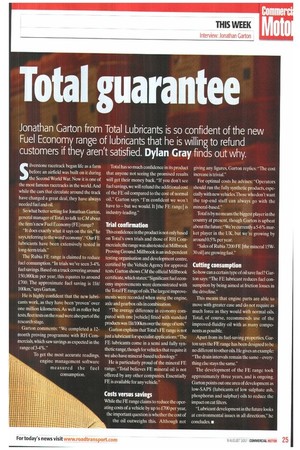Tota guarantee
Page 25

If you've noticed an error in this article please click here to report it so we can fix it.
Jonathan Garton from Total Lubricants is so confident of the new Fuel Economy range of lubricants that he is willing to refund customers if they aren't satisfied. Dylan Gray finds out why.
Silverstone racetrack began life as a farm before an airfield was built on it during the Second World War. Now it is one of the most famous racetracks in the world_ And while the cars that circulate around the track have changed a great deal, they have always needed fuel and oil.
So what better setting for Jonathan Garton, general manager of Total, to talk to CM about the firm's new Fuel Economy (FE) range?
"It does exactly what it says on the tin," he says, referring to the word `economy'."Our FE lubricants have been extensively tested in long-term trials."
The Rubia FE range is claimed to reduce fuel consumption. "In trials we've seen 3-4% fuel savings Based on a truck covering around 150,000km per year, this equates to around £700. The approximate fuel saving is I lit/ 100km," says Garton.
He is highly confident that the new lubricants work, as they have been `proven' over one million kilometres. As well as roller bed tests, fleet tests on the road were also part of the research stage.
Garton comments: "We completed a 12month proving programme with RH Commercials, which saw savings as expected in the range of 3-4%."
To get the most accurate readings, engine management software measured the fuel consumption. Total has so much confidence in its product that anyone not seeing the promised results will get their money back. "If you don't see fuel savings, we will refund the additional cost of the FE oil compared to the cost of normal oil." Garton says. "I'm confident we won't have to — but we would. It [the FE range] is industry-leading."
Trial confirmation This confidence in the product is not only based on Total's own trials and those of RH Commercials; the range was also tested at Millbrixik Proving Ground. Millbrook is an independent testing organisation and development centre, certified by the Vehicle Agency for approval tests. Garton shows CM the official Millbrook certificate, which states: "Significant fuel economy improvements were demonstrated with the Total FE range of oils.The largest improvements were recorded when using the engine, axle and gearbox oils in combination.
"The average difference in economy compared with one [vehicle] fitted with standard products was llit/100km over the range of tests" Garton explains thatTotal's FE range is not just a lubricant for specialist applications: "The FE lubricants come in a semi and fully synthetic range, though for vehicles that require it we also have mineral-based technology."
He is particularly proud of the mineral FE range. "Total believes FE mineral oil is not offered by any other companies. Essentially FE is available for any vehicle."
Costs versus savings While the FE range claims to reduce the operating costs of a vehicle by up to £700 per year, the important question is whether the cost of the oil outweighs this. Although not giving any figures, Garton replies: "The cost increase is trivial."
For optimal costs he advises: "Operators should run the fully synthetic products, especially with new vehicles.Those who don't want the top-end stuff can always go with the mineral-based."
Total is by no means the biggest player in the country at present, though Garton is upbeat about the future:"We're currently a 5-6% market player in the UK, but we're growing by around 0.5% per year.
"Sales of Rubia 7200 FE [the mineral 15W30 oil] are growing fast."
Cutting consumption So how can a certain type of oil save fuel? Garton says: "The FE lubricant reduces fuel consumption by being aimed at friction losses in the driveline."
This means that engine parts are able to move with greater ease and do not require as much force as they would with normal oils. Total, of course, recommends use of the improved-fluidity oil with as many components as possible.
Apart from its fuel-saving properties, Garton says the FE range has been designed to be no different to other oils. He gives an example: "The drain intervals remain the same — everything else stays the same."
The development of the FE range took approximately three years, and is ongoing. Garton points out one area of development as low-SAPS (lubricants of low sulphate ash, phosphorus and sulphur) oils to reduce the impact on cat filters.
"Lubricant development in the future looks at environmental issues in all directions," he concludes. •






















































































































































































